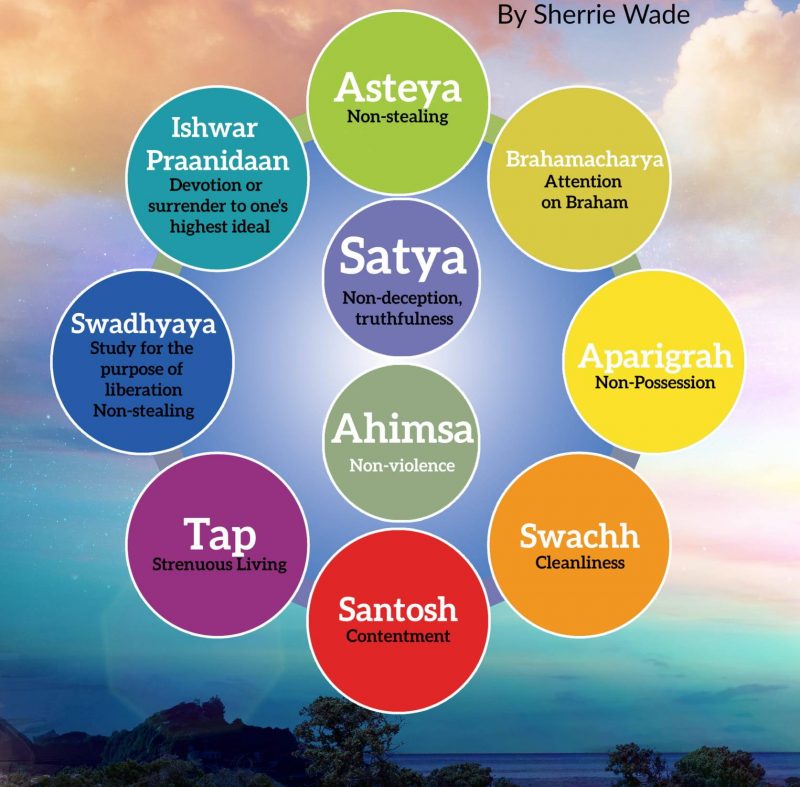Ten Guidelines from the Yoga Sutras: How to Stop Overeating and Eliminate Addictive Behavior

The Eight Limbs of Yoga
I. Yam – life-supporting style of being
1. Ahimsa—non-violence
In order to be truly non-violent you must not harm others or yourself. First you have to know how to not harm yourself in order not to harm others. Overeating is an act that harms the body and is harmful to your health. You may overeat or eat unhealthy foods because you feel uneasy, emotionally distraught, or unhappy. The practice of non-violence starts with loving yourself and then loving all living things. Eating a vegetarian or plant-based diet supports acting without violence to yourself, to other creatures, to the environment, and to the planet.
2. Satya—non-deception, truthfulness
How can you stay truthful to yourself? The one who wants to be a healthy weight has the intention to be truthful to themselves about what and how much they eat. However, the nature of an unfulfilled mind and disturbed nervous system is denial and dishonesty; the mind can delude you about what’s good to eat, how much to eat, or how much you’ve already eaten. To live in truthfulness is to honestly and clearly observe your mental conditions. It is a great power to be able to observe the mind’s thoughts about your eating patterns, as well as reactions to what you eat and how you feel afterwards. This self-observation will get you in direct contact with the Knower or observer of your thoughts and feelings.
 As one practices meditation by putting one’s attention on Knower, one remains free from the mind’s thought patterns and latent desires. Then you can observe your thoughts and desires objectively. When you are living in a free, truthful state of being you choose what you need to eat not only what you desire to eat. You are not dependent on the temporal experience of eating food for your permanent sense of satisfaction and fulfillment. In fact, you can now realize when you are really hungry and when you are only eating for sensual pleasure. I have found, since I am doing intermittent fasting, that I am not hungry at dinnertime and I just ate dinner out of habit. Now I usually eat much earlier and then can fast for 13 -16 hours per night before I eat my breakfast. That works well for me as I have lost ten pounds while eating my normal healthy diet the rest of the day. However, every system is different so you can observe your own mechanism to see what works best for you.
As one practices meditation by putting one’s attention on Knower, one remains free from the mind’s thought patterns and latent desires. Then you can observe your thoughts and desires objectively. When you are living in a free, truthful state of being you choose what you need to eat not only what you desire to eat. You are not dependent on the temporal experience of eating food for your permanent sense of satisfaction and fulfillment. In fact, you can now realize when you are really hungry and when you are only eating for sensual pleasure. I have found, since I am doing intermittent fasting, that I am not hungry at dinnertime and I just ate dinner out of habit. Now I usually eat much earlier and then can fast for 13 -16 hours per night before I eat my breakfast. That works well for me as I have lost ten pounds while eating my normal healthy diet the rest of the day. However, every system is different so you can observe your own mechanism to see what works best for you.
Eating without conscious awareness gives you a momentary sense of transcending the mind’s thoughts, through satisfying the senses while eating. But it does not bring you the full ability to transcend the mind’s problems. The true transcendence of the mind you only can only gain through the practice of meditation. When you are eating or drinking, or taking substances you only anaesthetize yourself temporarily. You eat the food, drink, or take the drug and it works temporarily as you are in a freer state and you like that state. However, shortly after that boost you are back where you started and have to do it all over again. You will be unhappy again and want to eat or take more drugs to get free from the mind’s state of unhappiness. Therefore, this becomes a dead end. That momentary sense of transcendence only mimics the state you will experience in meditation but once you believe that the food, drug, or alcohol made you happy or feeling free and easy, then you have to keep repeating that behavior to keep getting that momentary transcendence into happiness. The nervous system is weakened through the use of substances or over eating so moving forward you never feel good without the substances or without eating more and even richer foods. In meditation, you achieve a state of permanent and healthy transcendence from the mind without the harmful effects of substances or weight gain and you strengthen the nervous system at the same time.
From the vantage point of the Knower or the free state of being, you can pause and ask yourself: “What food is needed for my long-term health and well-being?” Also: “How will I feel after eating certain foods? Is that how I want to feel? If I eat something that I know is not good for me, but I crave it because it tastes good, are the few moments of sensual pleasure I receive while consuming it worth the inevitable downside of feeling physically terrible and mentally guilty for the rest of the day?” Sometimes just by delaying your eating and questioning it, you will gain clarity as to what food is or is not needed at that time for your true wellbeing. However, you always have the freedom to eat it or not. Sometimes you may decide to enjoy the ice cream and give yourself a treat. Other times you may decide that it is not needed at that time and that you are fine without it.
With the practice of meditation, when the attention shifts to the Knower of the mind, you remain watching the mind, senses, thought patterns, and even your latent desires. Then you are able to remain in a free and truthful state of being. You more naturally or automatically choose what you need as nutritional sustenance and not just what your mind and senses desire to eat for momentary transcendence or fulfillment. You are no longer dependent on the temporal experience of eating for your satisfaction and fulfillment.
Self honesty is the best step in loving yourself. You are non-violent to yourself by being truthful to yourself.
3. Asteya—non-stealing
Are you wasting time or stealing from your own life experience? Stealing your own time, energy, longevity, and the good company of your family and friends by being overweight or inactive? Considering the mentioned practice of satya—truthfulness—your answer may be yes. To live in a state of non-stealing, with a clarity about what you create as well as why and how you create it, you can benefit from higher awareness of your situation.
 Enjoying and sharing wonderful food and company with family and friends and using our supremely endowed human senses are a wonderful gift that humankind is blessed with. When sharing food it is often related to giving love to others. So turning down the food that someone offers you can be seen as an act of disregard for the person’s offering. But on a practical level food is meant for sustaining life and health, not for destroying it. Food can be a medicine or a poison.
Enjoying and sharing wonderful food and company with family and friends and using our supremely endowed human senses are a wonderful gift that humankind is blessed with. When sharing food it is often related to giving love to others. So turning down the food that someone offers you can be seen as an act of disregard for the person’s offering. But on a practical level food is meant for sustaining life and health, not for destroying it. Food can be a medicine or a poison.
Why would you knowingly steal from your most important and valued possession, your priceless treasury of long-term health and well-being? You merely only gain a few fleeting moments of passing sensual pleasure from eating that which is not best for you to sustain your health.
The Sage Patanjali states that when one is fully engaged in astaya, or non-stealing, all the wealth of the universe becomes yours. The greatest prosperity and wealth is your health. The health of the body goes through many changes that cannot always be prevented, but true health doesn’t change. True, unchanging health is the awareness that your body, mind, and thoughts do not limit you. You are the true Self that is swasth, established in healthfulness, as you are unchanging, pure, free, and forever!
4. Brahamacharya—attention on Braham
Human attention is naturally focused on attaining the maximum satisfaction that can be derived from the satisfaction of the senses and the mind. By investing all of one’s time and energy in fulfilling the myriad of human desires, one severely limits the potential of the human mechanism to attain higher functioning. To keep gaining pleasure and avoiding pain one has to keep actively engaged as one never feels totally fulfilled and settled.
 Those who are not self-satisfied get consumed in the need to fulfill all of their desires. They are bound to be overindulgent in addictive behaviors such as overeating or the use of alcohol or drugs to feel free from their disturbing mind and thoughts. These actions, unrestrained, are doomed to be repeated again and again.
Those who are not self-satisfied get consumed in the need to fulfill all of their desires. They are bound to be overindulgent in addictive behaviors such as overeating or the use of alcohol or drugs to feel free from their disturbing mind and thoughts. These actions, unrestrained, are doomed to be repeated again and again.
The great Sage Patanjali advises the human being—caught in this worldly dilemma—to place the human attention on Braham, God, or a higher power that is experienced in meditation. When you are established in meditative awareness, you start to feel fulfilled, peaceful, and needless. With attention on Braham, the source of all being, including the human being, one is progressively less inclined to overindulge in addictive action (self-violence) in order to seek fulfillment as you know you are already fulfilled.
Brahamacharya is usually translated as celibacy, which is neither practical nor possible for most people. There is, therefore, a need to redefine this practice so it can become usable for all practicing yogis and not create destructive suppression. Rather than curtailing the pursuit of sensual pleasures the need for directing the attention toward balance and non-violence is key in tempering human desires. This practice is beneficial to single and married people alike. When spiritual energy is directed towards the meditative state of awareness you are practicing brahmacharya; then your attention remains with Braham—your true Self. Now, even while engaging in the senses, you remain free as you are satisfied from within. You are now free to enjoy the senses but without the negative results of overindulgence in them. You can take care of your body and all of your worldly pursuits but you are free from the belief that it is who you are. Instead, you remain established as the Pure Being; uninvolved yet totally engaged in everything that suits you.
5. Aparigrah—Non-Possession
Living with a simple, uncluttered lifestyle helps in staying organized and efficient in one’s actions. This allows more time and energy for beneficial and relaxing activities. A simpler lifestyle also facilitates quality time and more ability to not spend as much money on unnecessary things. Then you don’t have to work as hard to earn as much money and you have more leisure time to enjoy it. When you focus on only satisfying your basic needs such as for clean water, healthy food, and basic shelter, this allows you to have more time for yourself as you don’t have to supervise and maintain as many things. You have less stress and anxiety by having fewer employees and things to manage.
In order to remain self-satisfied and free from the sense of lack and neediness (the idea that possessing things will raise your self esteem and happiness and not possessing things lowers it) meditate and directly experience the Self-realized state that is already complete. In the Self-realized state, a sense of ease and natural esteem flows constantly from its eternal source. If you spend time reading or listening to yogic philosophy, or content that facilitates meditation and self-reflection, rather than only reading novels and watching TV, and movies, you will naturally remain in a more fulfilled state.
II. Niyaam—purification of body and mind
6. Swachh—Cleanliness
Swachh, advises maintaining a clean and tidy living environment and even more important—a purified inner space. Food choices and activities that are not conducive to healthy aware living are naturally reduced and progressively eliminated when you add meditation. A healthy body and organized home helps cultivate a buoyant inner space. You can then remain more relaxed and easy so you can mediate more often. A clean space assists you in having a clear mind so it is easier to remain still and know the Knower.
7. Santosh—Contentment
Sometimes it may appear that these eight limbs are not in the right order. True contentment can occur only when you are in samadhi which is the eighth limb. The master or Guru puts you in samadhi immediately through their direct contact but you will not maintain it unless you practice meditation. In order to have the strength of mind and body to practice meditation the complete yog sadhana, or the eight limbs are suggested. They are a package deal and work their magic when practiced together.
The more one practices yog sadhana the more vairagya (detachment) is cultivated through Self-inquiry and inner observation. You begin to see clearly that acquisition of things and relative associations with form does not bring total fulfillment, rather you observe that they are transitory and impermanent experiences. Through meditation, you can unfold the true state of santosh, contentment, by knowing that Self is permanent, undivided, all-encompassing and exists in all. You now know you are not separate from your true Self. Self’s true nature is pure, free, and forever—so you start to experience your own being as pure, free, and forever and this brings a wonderful feeling of contentment and peace—called santosh. First you establish yourself in the contentment from the joy of meditation and then, naturally, you are engaged in all constructive behaviors as you are content from within.
- Tap—Strenuous Living
In the developed world, the act of needing to walk anywhere has mostly been eliminated. You can get into your car and drive to your office, to the shops, or to an appointment. If you have the money you can hire a cleaning service to do your housework, eat-out in restaurants, or order-in meals instead of cooking at home. This can result in a lot of down time to just sit on a comfortable couch with a clicker in-hand and stare at a big-screen TV as much as desired.
 Modern life, as described above, offers more leisure time to use in frivolous, sedentary inactivity. People drive to the gym, park in the closest parking spot and take the elevator up so they can walk on the treadmill, climb on the stair master, or ride on a stationary bike. Obviously, going to the gym has benefits, but we can also use activities such as walking home, carrying groceries, or taking the stairs rather than the elevator as a natural opportunity for exercise.
Modern life, as described above, offers more leisure time to use in frivolous, sedentary inactivity. People drive to the gym, park in the closest parking spot and take the elevator up so they can walk on the treadmill, climb on the stair master, or ride on a stationary bike. Obviously, going to the gym has benefits, but we can also use activities such as walking home, carrying groceries, or taking the stairs rather than the elevator as a natural opportunity for exercise.
You can still allow technology to enable conveniences but you can also consciously choose to use your free time to live a healthy life. There is satisfaction in self-reliance and independence when you cultivate tap, or more strenuous living. The true tap, often called tapasya, is when you undergo hardships knowingly but for the purpose of your liberation. When you would prefer to have your lunch or dinner or watch a movie, but decide to instead continue your meditation and study of scriptures, this strengthens your practice of yog sadhana. You become established in health, mental strength, stamina, and stability.
9. Swadhyaya—Study for the purpose of liberation
You have probably already studied many dietary guides, self-help books, and philosophical teachings. But, it’s important to know what and how to study. Swadhyaya directs us to study for the purpose of liberation. Philosophical scriptures like Patanjali Yoga Darshan—the original text on yoga practice—is an example of a type of writing that guides us to directly awaken the liberated state of being. Patanjali Yoga Darshan, originally written in Sanskrit, is a language made up of sounds and meanings that are based on mantras.
The word mantra means “mind release.” When you correctly pronounce a Sanskrit word and know the meaning, your mind is freed from its previous waking state thinking patterns. Then a higher state of consciousness is opened. This type of practice allows the achievement of a fulfilled state where liberation from the sense of neediness and desire for only sensual or physical satisfaction drops away.
Swadhyaya is in reality the study and inquiry into the knowledge of the Self. This study develops naturally in meditation as well as from the observation of your own nervous system and changing mind’s functioning. In meditation you begin to observe, You, the very Knower itself. Inquiry into the Knower brings the result of transcendence of the waking state of consciousness into the fourth state of consciousness, whereby you are resting in your true Self. Study for the purpose of liberation inspires you to know the Knower by shifting your attention to the unchanging, eternal source of your being.
Even if you find it difficult to sit in silent meditation for very long, you can begin the meditative transcendence through listening to or reading the words of enlightened beings. Then you can close your eyes even for brief moments and rest in that free state of awareness. It only takes a few moments to close your eyes and watch the pure space seen behind your closed ears. Even a few minutes in this awareness will bring wonderful results.
10. Ishwar Praanidaan—Devotion or surrender to one’s highest ideal
This type of devotion is an integral component in most twelve-step and recovery programs as they all tend to emphasize the importance of surrendering to a higher power. This becomes problematic when one does not believe in or want to surrender to a higher power which appears to be separate from yourself. Gyan yoga, the yogic path of expanding intellectual knowledge and awareness to reach the Self, and Advait Vedant, the knowledge of Self as One without a second (non-dual), are diametrically opposite to the idea of surrender to God. Devotion and surrender to a form or ideal means there is division. God, the one worthy of your devotion, appears separate from you, the devotee. A highly aware, intelligent human being may or may not be inclined to this type of practice. However, with the understanding that there is no one separate to surrender to, surrender takes on a different meaning.
 Patanjali’s yogic system describes Kaivalya as the ultimate liberation and when one attains this realized state of being, one is forever free. From the vantage point of Kaivalya, the concept of Ishwar Praanidaan, surrender and devotion to an external ideal, can be very confusing—especially if you do not know who is surrendering to whom. If there is no one other than you, the Self, then you are, in fact, surrendering your own individual sense of separation in order to unite your awareness with the highest aspect of You—which is the true Self. This act of ultimate union completely releases the individual, dualistic mind and expands you into the liberating knowledge of the Whole. So you are not actually surrendering, but, in effect, re-merging with that which you always have been—your very own Self! Surrender then means knowledge of the One Self alone everywhere rather than the knowledge of division of an individual self and a higher Self. Self alone is.
Patanjali’s yogic system describes Kaivalya as the ultimate liberation and when one attains this realized state of being, one is forever free. From the vantage point of Kaivalya, the concept of Ishwar Praanidaan, surrender and devotion to an external ideal, can be very confusing—especially if you do not know who is surrendering to whom. If there is no one other than you, the Self, then you are, in fact, surrendering your own individual sense of separation in order to unite your awareness with the highest aspect of You—which is the true Self. This act of ultimate union completely releases the individual, dualistic mind and expands you into the liberating knowledge of the Whole. So you are not actually surrendering, but, in effect, re-merging with that which you always have been—your very own Self! Surrender then means knowledge of the One Self alone everywhere rather than the knowledge of division of an individual self and a higher Self. Self alone is.
The practice of Ishwar Praanidaan empowers people to realize their greatness, wholeness, and completeness while simultaneously acknowledging that the individual mind of a human being is limited and incomplete. Since You, the Self, are never confined to the human mind, you can, through meditation, and its resulting state of samadhi (perfect oneness) purify the human mind and intellect to always remember one’s source as Self which is pure, free, and forever. Established in that awareness you are totally fulfilled and one with God or the highest consciousness.
 About the Author
About the Author
Sherrie Wade, M.A., (Shree) Director of Transformation Meditation Online Institute has come to realize that the peaceful meditative state is our true nature. Recently she has published a book titled, Knowingness Meditation: Enlightenment is Now. She has spent over 16 years training meditation teachers with her home-study courses. She speaks and writes with clarity and wisdom as to how one can unfold this awareness and transform one’s life. She is a certified meditation instructor, Himalayas, India, where she has spent over twenty years in self-inquiry and study. For more information, please visit her website: www.transformationmeditation.com.































